 Like everybody else, my life is a jumble of random facts. Selecting five is a bit like being asked to name my favourite book but here goes… Like everybody else, my life is a jumble of random facts. Selecting five is a bit like being asked to name my favourite book but here goes…
Childhood
Contrary to popular belief, I was once a child. but it was a long time ago. And yes, that is a smocked frock.At the time, small children were hauled off to a photographic studio, given a soft toy to manhandle and told to smile for the nice man (And it almost always was a man in those antique times.)
Favourite holiday?
Where other people don’t go. Good food, warm but not boiling hot weather and some interesting Roman ruins, especially where you can shut your eyes and take a deep breath without getting run over. Did a lot of camping throughout Europe over the years, but it was more like glamping.
Name dropping
To my great pleasure, I’ve met and spoken at events with Lindsey Davis, Kate Mosse and Barbara Erskine and had books endorsed by Sue Cook, Conn Iggulden and Simon Scarrow.
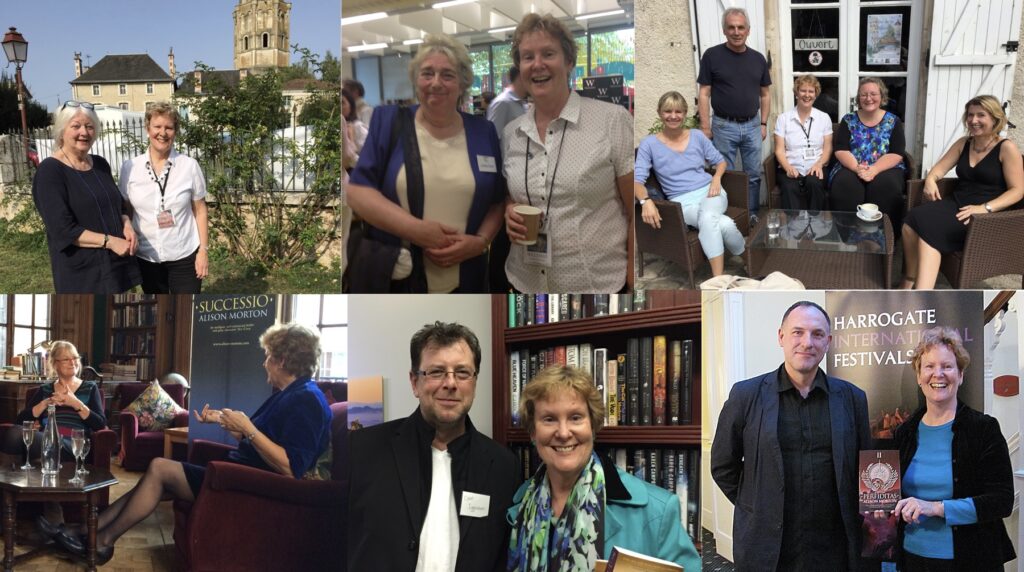
Enough of that…
The military link
I spent six years in uniform doing lots of silly things in different parts of the world, some of it not in uniform… But I learned things most people don’t and also met my husband.
Favourite drink
Tea when working, otherwise bubbly, of course. I’m lucky to live in the Loire Valley where they produce some exceedingly fine wine. Cheers!

Writing challenges so far:
Day 8: What’s your writing process?
Day 7: Introduce your ‘author friend’
Day 6: How the writing all began
Day 5: What inspired the book I’m working on
Day 4: The setting for the new Roma Nova book
Day 3: Introducing the main characters Julia and Apulius
Day 2: Introduce your work in progress
Day 1: Starting with revealing information
Alison Morton is the author of Roma Nova thrillers – INCEPTIO, PERFIDITAS, SUCCESSIO, AURELIA, INSURRECTIO and RETALIO. CARINA, a novella, and ROMA NOVA EXTRA, a collection of short stories, are now available. Audiobooks are available for four of the series. NEXUS, an Aurelia Mitela novella, is now out.
Find out more about Roma Nova, its origins, stories and heroines… Download ‘Welcome to Roma Nova’, a FREE eBook, as a thank you gift when you sign up to Alison’s monthly email newsletter. You’ll also be first to know about Roma Nova news and book progress before everybody else, and take part in giveaways.
If you enjoyed this post, do share it with your friends!Like this:Like Loading...
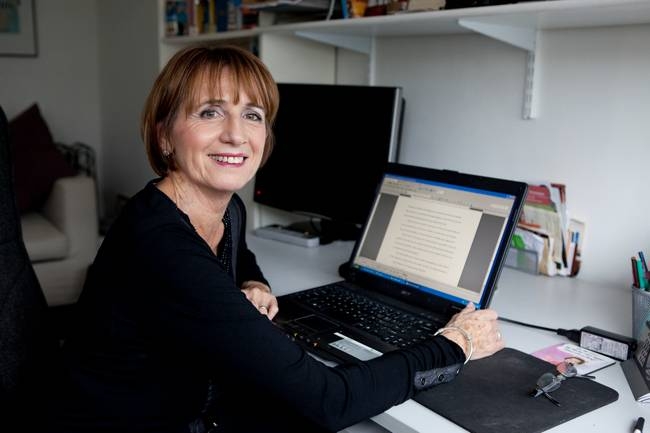 Today’s guest is Liz Harris a friend from my earliest writing days. Liz was born in London. After graduating with a law degree, she moved to California for six years where she led a varied life from waitressing on Sunset Strip to working as secretary to the CEO of a large Japanese trading company to helping with studio tours at MGM. Real life eventually intervened and she returned to the UK, completed a London University degree in English and then taught for a number of years in Berkshire and later in Cheshire. Today’s guest is Liz Harris a friend from my earliest writing days. Liz was born in London. After graduating with a law degree, she moved to California for six years where she led a varied life from waitressing on Sunset Strip to working as secretary to the CEO of a large Japanese trading company to helping with studio tours at MGM. Real life eventually intervened and she returned to the UK, completed a London University degree in English and then taught for a number of years in Berkshire and later in Cheshire.
Liz’s first six novels were published by Choc Lit including The Road Back (US Coffee Time and Romance Book of the Year), A Bargain Struck (RoNA shortlisted for the Best Historical Novel). They and Evie Undercover, The Art of Deception, A Western Heart and The Lost Girl were shortlisted by the Festival of Romantic Fiction. Liz’s latest novel, The Dark Horizon, is Book 1 in the Linford Series. Book 2, The Flame Within will be published in October 2020.
A (fellow) member of the Romantic Novelists’ Association and Historical Novel Society, Liz gives talks and workshops at conferences and literary festivals, and regularly speaks to WI and book groups.
Over to Liz to discuss one of my favourite writing topics!
I heard your groan at the word research! And I, too, have been known to groan when faced with a day of fact-digesting. When I hear ‘research’, I see myself bending over a pile of dusty books. And to be honest, it’s not a vision I like. I’m more at ease with a vision of myself wherein I’m holding forth among friends, a large glass of wine in my hand.
But needs must. If you write an historical series set in the 1920s and early 1930s, with an important part of the first novel set in New York, as with The Dark Horizon, you must research that period and location.
The place to begin is with books. This is only a fraction of the books in which I’ve lost myself as I build a picture of what my characters wear, eat, drink; how they fill their day, be it with a paid job, or otherwise; how they get about; the aromas in the air/streets; what the climate is like; what flora and fauna surround them. And so on.
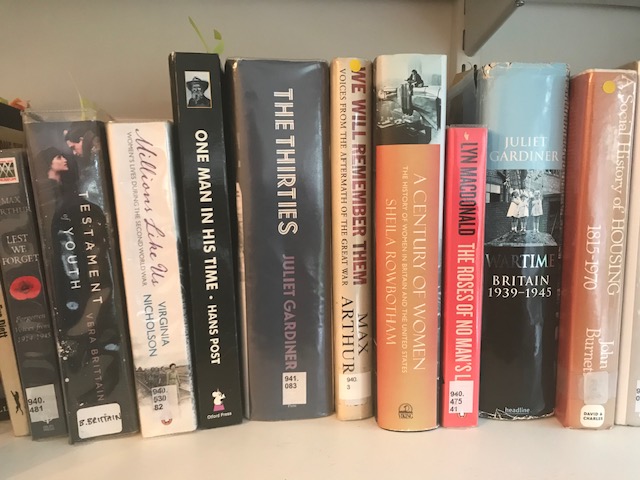 Some of the research books on my shelf For certain facts, you need books or the internet. For example, for a saga set between the wars you’ll possibly need to know the prevailing situation regarding divorce. Books/the internet will tell you that the Matrimonial Causes Act, 1857, introduced divorce through the High Court in London, the proceedings being in open court. Men could petition for a divorce on the basis of their wife’s adultery. If a woman was divorced due to adultery, she had no legal rights to her children.
However, women wanting to divorce their husband needed to prove, in addition to adultery, an aggravating factor, such as rape or incest. The aggravating factor wasn’t removed until an Act in 1923 finally put men and women on an equal footing.
But there’s some research that’s ideally done in person, if possible. So I made the great sacrifice of going to New York for hands-on research. I wanted to feel like an immigrant in the 1920s, so I headed for Lower East Side, known as the Garment District, the main destination for the immigrants, who streamed through the immigration station at Ellis Island between 1880 and 1924.
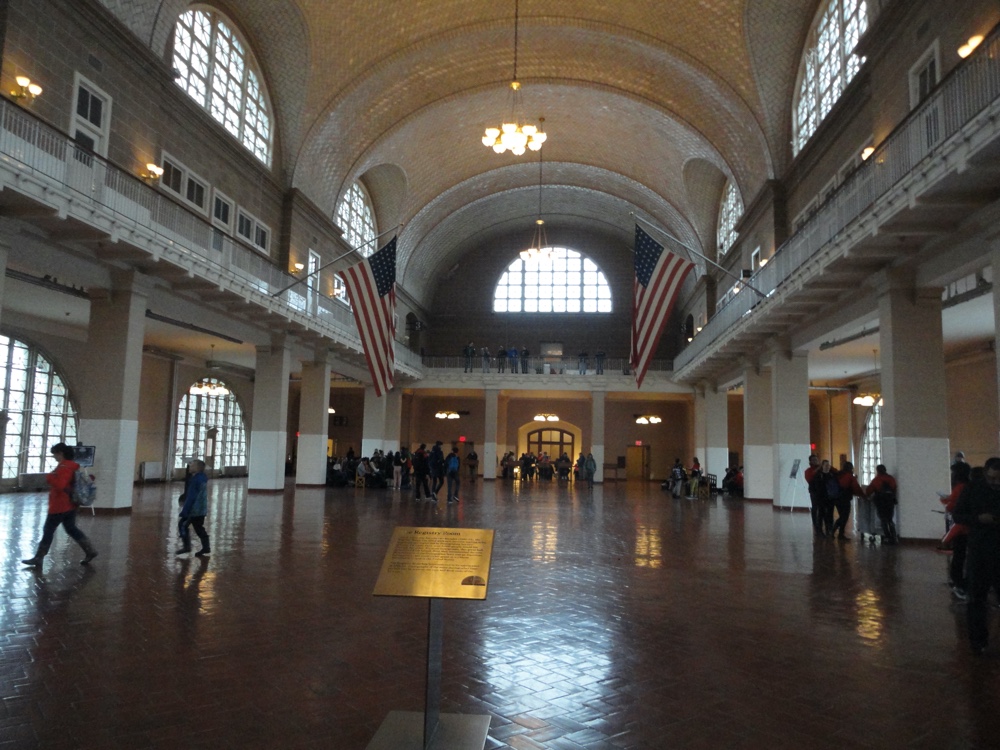 Immigration Hall, Ellis Island, New York I walked the streets they walked, shopped in the shops they used, breathed the air they breathed (it had been recycled a few times since the 1920s, but so be it).
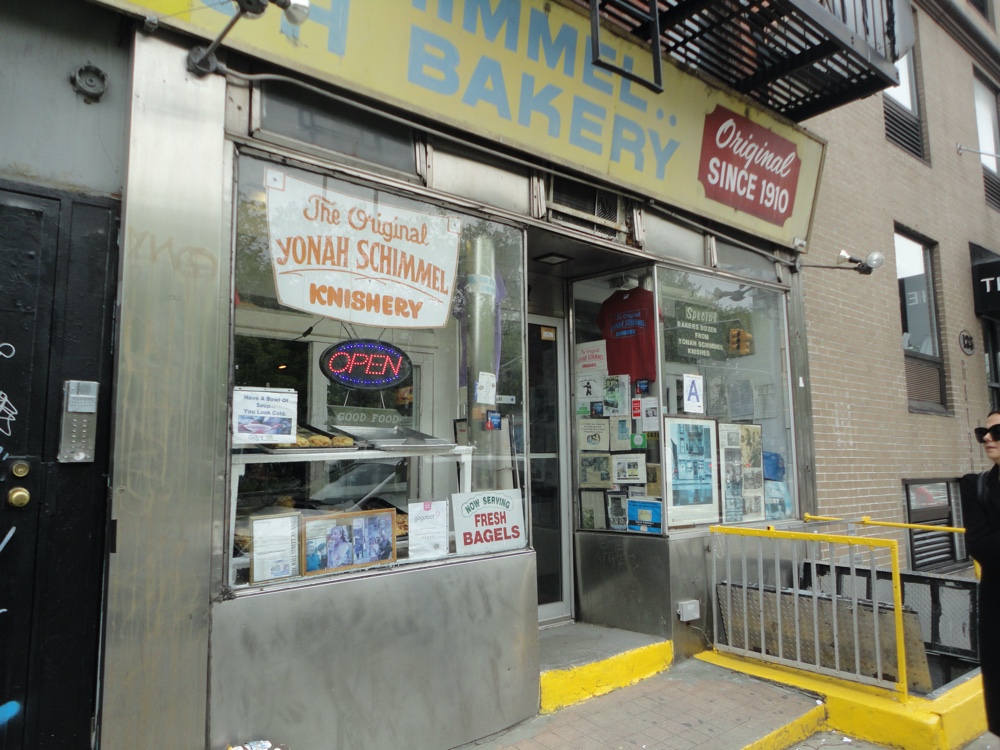 Yonah Schimmel’s Bakery I learned that in the early 1900s, almost 500,000 of the Lower East Side’s residents were Jewish, the largest Jewish community in the world, and mostly they lived in five- and six-storey tenement buildings. Each building contained four apartments per floor, and often several families lived in each apartment, in conditions that were cramped and dark, with little natural sunlight.
 Lower East Side tenement building in Orchard Street where the apartments have been meticulously restored to the original Tenement apartments were frequently not only a home, but a place of work, as the tenants often employed others to work for them in their apartment, as well as working there themselves as piecework seamstresses or tailors.
The apartments became known as sweatshops. I used to think the term ‘sweatshop’ applied only to factories with dubious practices. But not so. The nature of the work and the working conditions—low wages, long hours, unhealthy environment—defines a sweatshop, not the building, nor the number of people working there.
How the work was arranged was that Macy’s, for example, would order 100 dresses from a factory. They’d pay the factory $75. For speed, the factory subcontracted different parts of the garments to sweatshops, paying by the piece. Wages were permanently depressed as there’d always be someone who’d take on the work, no matter how low the pay.
Making mass-produced cigars was also common in the tenements. The cigar mould, invented in 1860, meant tobacco could be pressed into several grooves, thus making multiple cheap cigars.
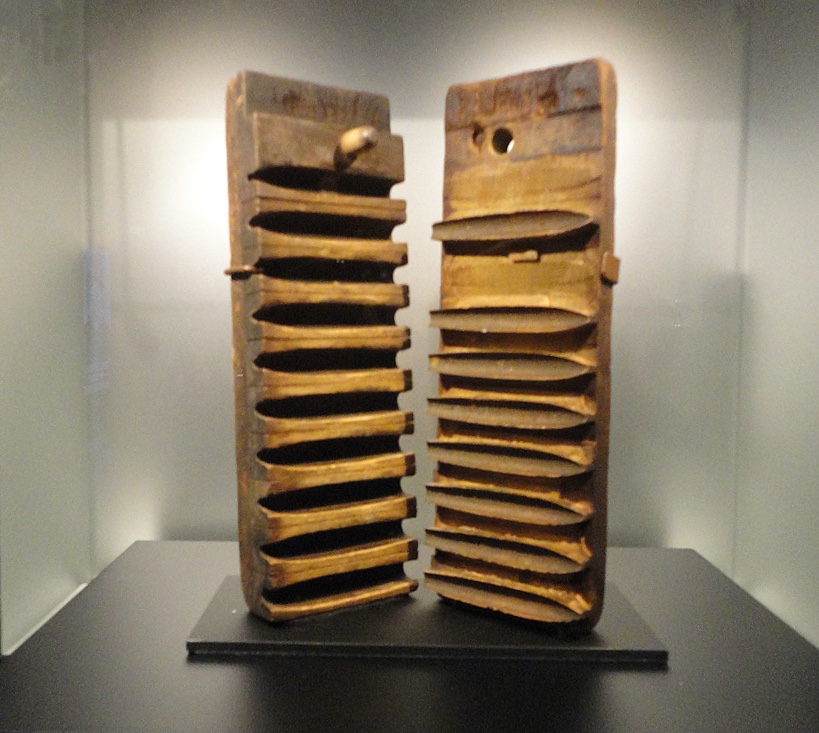 Cigar mould In 1901, sweatshops were outlawed and tenement dwellers forbidden to employ anyone from outside the home. But being virtually impossible to regulate, and the manufacture of cheap goods so desirable, this was widely ignored.
In a move clearly intended to reduce the influx of Jewish and Italian immigrants, the Immigration Act, 1924, restricted the overall number of immigrants, establishing quotas based on nationality. The number of immigrants substantially fell, and when tenement dwellers moved to other towns in the US, as they invariably did—it was a transitory population—there were insufficient people to fill the apartments, and many lay empty.
 Eldridge Street Synagogue. Built in 1887, this was one of the earliest synagogues in the US, its inner elegance reflecting the immigrants’ hopes for the New World. But this is called The Research Diet., I can hear you wail. Where does dieting come into this, you ask.
Aha! Researching your novel, whether through books at home or in the library, whether on the internet or on location, is so utterly absorbing that you’ll completely forget to eat!!
Haha! Brilliant, Liz. These photos reminded me of my own research trip to New York for the early part of INCEPTIO. Lovely reminders, thank you.
Connect with Liz…
Website: www.lizharrisauthor.com
Twitter: https://twitter.com/lizharrisauthor @lizharrisauthor
Facebook: https://www.facebook.com/lizharrisauthor
Instagram: https://www.instagram.com/liz.harris.52206/ liz.harris.52206
What’s The Dark Horizon about?
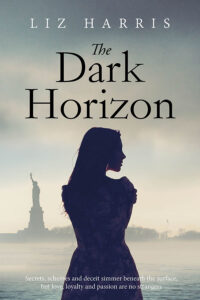 From the award-winning author of The Road Back comes the first in a sweeping saga set between the wars, which introduces the Linfords, a family simmering with secrets, schemes and lies. From the award-winning author of The Road Back comes the first in a sweeping saga set between the wars, which introduces the Linfords, a family simmering with secrets, schemes and lies.
Oxfordshire, 1919
The instant that Lily Brown and Robert Linford set eyes on each other, they fall in love. The instant that Robert’s father, Joseph, chairman of the family’s successful building company, sets eyes on Lily, he feels a deep distrust of her.
Convinced that his new daughter-in-law is a gold-digger, and that Robert’s feelings are a youthful infatuation he’d come to regret, Joseph resolves to do whatever it takes to rid his family of Lily. And he doesn’t care what that is.
As the young couple are torn apart, the Linford family is told a lie that will have devastating consequences for years to come.
Amazon (universal) buying link: https://getbook.at/TheDarkHorizon
Alison Morton is the author of Roma Nova thrillers – INCEPTIO, PERFIDITAS, SUCCESSIO, AURELIA, INSURRECTIO and RETALIO. CARINA, a novella, and ROMA NOVA EXTRA, a collection of short stories, are now available. Audiobooks are available for four of the series. NEXUS, an Aurelia Mitela novella, is now out.
Find out more about Roma Nova, its origins, stories and heroines… Download ‘Welcome to Roma Nova’, a FREE eBook, as a thank you gift when you sign up to Alison’s monthly email newsletter. You’ll also be first to know about Roma Nova news and book progress before everybody else, and take part in giveaways.
If you enjoyed this post, do share it with your friends!Like this:Like Loading...
 (Photo: Uschi Hering) *Falls over laughing*
Right I’m going to try to take this seriously (Puts on stern face)
My first characters had been running around in my head for years before I tapped the keyboard so they were fully formed when I started to write the Roma Nova stories. Of course, I’ve added others over the years, so I check how they’re interacting with the old stagers. Cue spreadsheet with ages and major events. Nobody wants to marry their son or have the legendary 11-month pregnancy.
I usually have an idea of what I want a character to achieve. Back in 2012, I evolved a vague system to put some structure into each story and wrote a post called How to write a novel in 30 lines. It runs from inciting incident, three crisis points, the black moment to climax and resolution. I still use it. But that’s the extent of my planning ahead.
The detail evolves as I tap on the keyboard. The characters’ quirks and interactions push the story along. Sometimes, they try to stage a coup and take over the show. Excuse me! Who is writing this book? After an hour of negotiation we agree on a compromise and I nudge them back into the story, promising death, agony or separation from their beloved if they don’t behave. (I do that anyway, but don’t tell them ahead of time.)
After an hour of this bickering, I go for a tea break and decide I’ll do something calming like marketing.
Track and trace (Yeah, but mine works.)
I’ve developed a tracking grid (which you can download for free) which keeps the timeline straight and where I can jot down the main actions in each chapter – a kind of DIY ‘do it as you go along’ index to the book. After the first rough draft was finished, I used to put the file in a folder and try ignore it for at least six weeks and work on something else. But these days, I load it onto my Kindle and have a quick read through to see if it has the ‘legs’ as a story – no editing allowed at this stage. Then I ignore it.
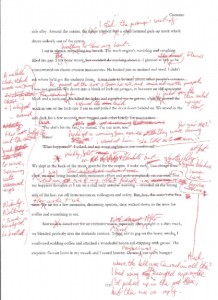 When I open it again, I carry out the first edit with my red pen. And I’m really tough on myself. No, I’m brutal. Every sentence is fixed with my version of Mad-Eye Moody’s orb. When I open it again, I carry out the first edit with my red pen. And I’m really tough on myself. No, I’m brutal. Every sentence is fixed with my version of Mad-Eye Moody’s orb.
Then off the draft goes to my critique partner who is eagle-eyed, caring and scrupulously honest, so is a sounding board as well as critic. She will look for (and find) plot holes, character failings, extraneous or awkward scenes and inconsistent dialogue but more than anything she will check for cohesiveness and whether the story grips. Without page-turning quality, the book won’t deliver a good read and that’s the writer’s duty.
Then revisions and on to a final professional copy edit and any further revisions. After all this, it gets turned into an ebook and paperback using the wonderful Vellum software then it’s uploaded to electronic retailers like Amazon, Kobo, Apple and B&N Nook and to Ingram Spark for printing.
Interspersed with this are hours of mind-expanding research, tracking down odd books on odd Roman stuff, spending hours on the Glock and Google Earth sites or working out how to stage a coup.
Are you a writer? I bet you’re more organised…
——-
Writing challenges so far:
Day 7: Introduce your ‘author friend’
Day 6: How the writing all began
Day 5: What inspired the book I’m working on
Day 4: The setting for the new Roma Nova book
Day 3: Introducing the main characters Julia and Apulius
Day 2: Introduce your work in progress
Day 1: Starting with revealing information
Alison Morton is the author of Roma Nova thrillers – INCEPTIO, PERFIDITAS, SUCCESSIO, AURELIA, INSURRECTIO and RETALIO. CARINA, a novella, and ROMA NOVA EXTRA, a collection of short stories, are now available. Audiobooks are available for four of the series. NEXUS, an Aurelia Mitela novella, is now out.
Find out more about Roma Nova, its origins, stories and heroines… Download ‘Welcome to Roma Nova’, a FREE eBook, as a thank you gift when you sign up to Alison’s monthly email newsletter. You’ll also be first to know about Roma Nova news and book progress before everybody else, and take part in giveaways.
If you enjoyed this post, do share it with your friends!Like this:Like Loading...
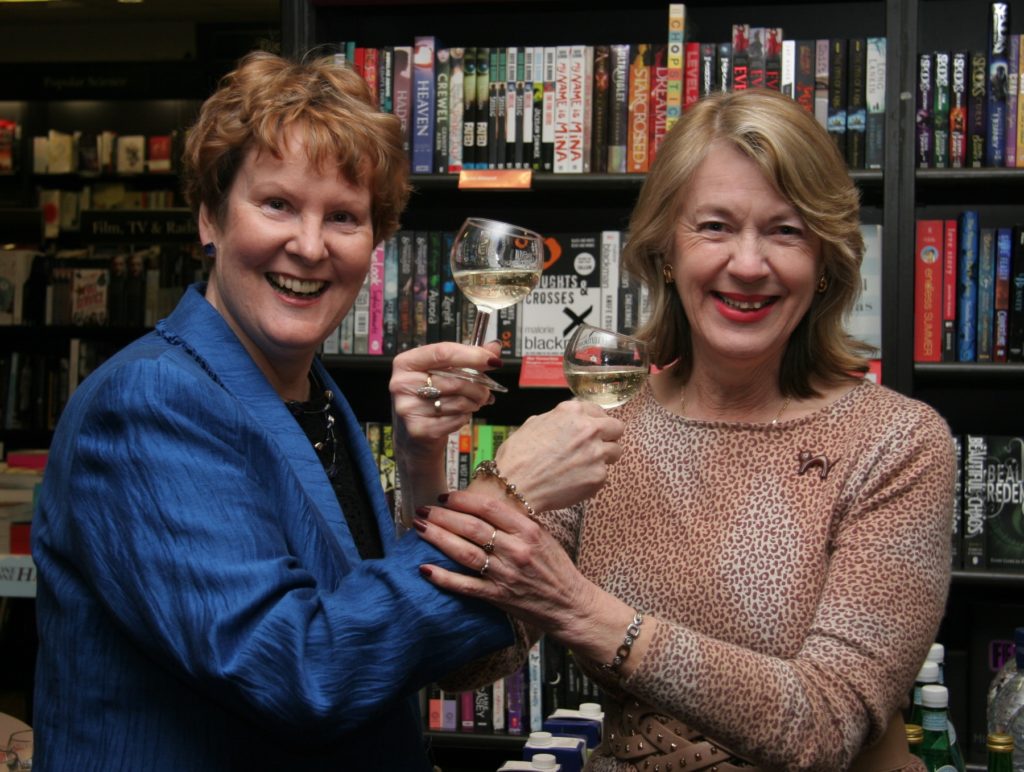 On Sunday, I enjoyed a ‘writerly’ Skype with my critique partner, another novel writer, Denise Barnes (a.k.a. Molly Green), who has just sent her latest fiction work off to her editor at Avon Books. It’s the third in a series about sisters in the Second World War; they’re each ‘doing their bit’ for the war effort, often in dangerous circumstances. But of course, their personal relationships, romantic or otherwise, add that special sparkle. On Sunday, I enjoyed a ‘writerly’ Skype with my critique partner, another novel writer, Denise Barnes (a.k.a. Molly Green), who has just sent her latest fiction work off to her editor at Avon Books. It’s the third in a series about sisters in the Second World War; they’re each ‘doing their bit’ for the war effort, often in dangerous circumstances. But of course, their personal relationships, romantic or otherwise, add that special sparkle.
We swap hints and tips, recommend and exchange books, encourage each other about courses and competitions. But the best thing is that we read each other’s work and critique it. Now you have to get on well to do this, so well that you can say things that may seem harsh. But we have to be completely, and sometimes brutally, honest. It’s a pointless exercise otherwise. With both of us going through the same process, we can empathise as well as criticise.
On a practical note, we agree parameters – help on plotting, characterisation, emotion, cliff hangers, layout, social media promotion, structure, early proof-reading for grammar, punctuation, typos etc. While our imagined worlds are quite different, we get really involved in them. It’s spooky when she turns round to me and says things like this about my heroine,’You know, that’s the sort of thing Carina would say.’
Her novels are family and/or wartime sagas, mine action thrillers in an alternative Roman timeline; both sets of books feature heroines finding their ways and, from a writing point of view, direct the narrative. They are all firmly in charge of their story. Denise’s early novels written as Fenella Forster (The Voyagers Trilogy) cross several continents and times; they’re such absorbing reads!
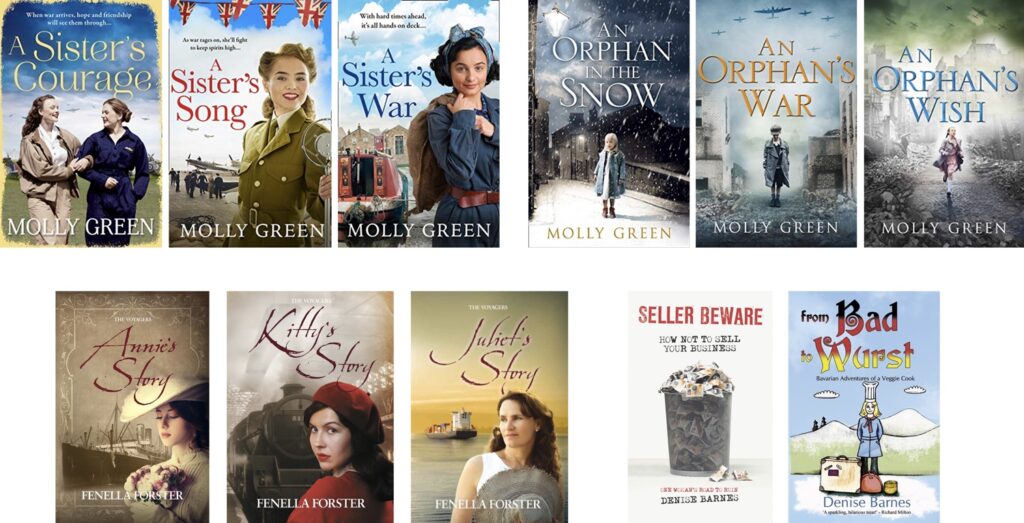
And at the start of her career, Denise wrote two non-fiction books; one a semi-comic memoir based on her experiences as a vegetarian cook in Bavaria and secondly, a very accessible guide on how not to sell your business.
Luckily, we both have outgoing personalities and having both owned businesses in a tough commercial environment, we have had to make difficult decisions and say things that were not always welcome. We’re quite nice really!
It’s a bit like any serious relationship: you go on a few (book) dates, get to know them, then take a leap as you move in with them (hand your whole manuscript over to them).
Trust is key: you are handing over your ‘baby’ for another to look at, assess and critique. But hopefully that person will stand as a godparent/patron/responsible adult and help the infant mature into a full-grown adult.
Some techniques
- You have to trust that they’re good at writing, that they are serious about their writing, and most of all that they ‘get’ your work and critique it with a true heart
- Firm, honest feedback but no ego-tripping
- Courage to say the unspeakable/awkward
- Genuinely want the best for you – grow, to improve, to have successes
- Happy for the other critique partner when they reach various milestones
- Sympathise about rejections or when down in dumps
Denise has just finished her second wartime trilogy for Avon/Harper Collins and I’m on my tenth Roma Nova book. Neither of us would have reached this point without the other. If you write, find a critique partner/writing buddy – they’re worth their weight in gold!
——-
Writing challenges so far:
Day 6: How the writing all began
Day 5: What inspired the book I’m working on
Day 4: The setting for the new Roma Nova book
Day 3: Introducing the main characters Julia and Apulius
Day 2: Introduce your work in progress
Day 1: Starting with revealing information
Alison Morton is the author of Roma Nova thrillers – INCEPTIO, PERFIDITAS, SUCCESSIO, AURELIA, INSURRECTIO and RETALIO. CARINA, a novella, and ROMA NOVA EXTRA, a collection of short stories, are now available. Audiobooks are available for four of the series. NEXUS, an Aurelia Mitela novella, is now out.
Find out more about Roma Nova, its origins, stories and heroines… Download ‘Welcome to Roma Nova’, a FREE eBook, as a thank you gift when you sign up to Alison’s monthly email newsletter. You’ll also be first to know about Roma Nova news and book progress before everybody else, and take part in giveaways.
If you enjoyed this post, do share it with your friends!Like this:Like Loading...
 Ampurias mosaic I’ve always enjoy writing, but not fiction; essays at school (often fictional), civil service papers and reports, business plans, company PR materials, insurance analyses (so exciting!); corporate documentation, brochures, military reports and fifteen years’ worth of translation and editing.
Words fascinate me, how they’re derived, how they’re used and what they can do. And the fascination spreads over into other languages. Nobody likes comparative word registers and vocabulary analysis like me. (Well, perhaps somebody else does…)
My imagination gets out of hand all the time and I enjoy telling a tale, but write a story? A whole book? Nah!
Then three things came together.
The first was when a memory of when I was on holiday near Ampurias in Spain one summer. Here’s the story…
A small child, curls bobbing on a head she’s forgotten to cover with the sunhat her mother insists on, crouched down on a Roman mosaic floor in north-east Spain. Mesmerised by the purity of the black and white pattern, the craftsmanship and the tiny marble squares, she almost didn’t hear her father calling her to the next one.
Jumping up, she eagerly ran to him, babbling questions like many eleven year olds do: who were the people who lived here, what were they called, what did they do, where have they gone?
The father, a numismatist and senior ‘Roman nut’, started telling her about the Greek town of Emporion founded 575 BC which became Roman Emporiæ in 218 BC, where traders sailed in and out with their cargoes of olive oil, wine, textiles, glass and metals; where people lived in higgledy-piggeldy houses, traded from little shops; where the Roman army based its operations; where money was minted. And the people came from every corner of the Roman Empire to live and work. Boys went to schools and girls learnt to be good wives and mothers.
The little girl listened carefully to every word, sifting the information. Her hand in his, she turned as they leave, looked back at the mosaics and asked her father a final question.
“What would it be like if Roman women were in charge, instead of the men?”
Maybe it was the fierce sun boiling my brain that day, maybe I was just a precocious kid asking a smartarse question. But clever man, my father replied:
“What do you think it would be like?”
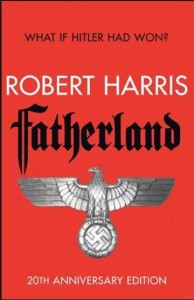 The second piece of the jigsaw was when I picked up Robert Harris’ Fatherland in my local independent bookshop in 1992. The emotional high of the breaching and tumbling down of the Berlin Wall was only three years before. Germany, and Europe, was redefining itself. Into this whirling pot was thrown the concept of ‘what if Nazi Germany had won the war?’ Others had tackled it before; I had a vague memory of watching An Englishman’s Castle starring Kenneth More when I was younger, but it hadn’t clicked then. The second piece of the jigsaw was when I picked up Robert Harris’ Fatherland in my local independent bookshop in 1992. The emotional high of the breaching and tumbling down of the Berlin Wall was only three years before. Germany, and Europe, was redefining itself. Into this whirling pot was thrown the concept of ‘what if Nazi Germany had won the war?’ Others had tackled it before; I had a vague memory of watching An Englishman’s Castle starring Kenneth More when I was younger, but it hadn’t clicked then.
Reading Fatherland, I started to speculate on what would have been the alternate path of history? Suppose Elizabeth I had married and had children? Suppose Julius Caesar hadn’t been assassinated? Suppose women had got the vote in Britain when New Zealand women did in 1893? Suppose, suppose, suppose…
Until then, I hadn’t realised you really could project history forward in a different line, but in a non-fantasy logical progression. Revelation!
But the third thing, the trigger that made me sit down and wear my fingers out for the next few months writing INCEPTIO?
 Ewan McGregor In 2010 my husband and I (as they say) were sitting in a darkened cinema theatre, waiting for the movie to start. We’d picked this film, based on a popular novel, as it was the least worst on offer at the local multiplex. And it had Ewan McGregor in a key role…
The film started; exciting music, great cinematography, but thirty minutes in, we realised the plot was dire and narration hacked and chopped so many times the story was unintelligible.
‘I could do better than that,’ I whispered to my husband.
‘So why don’t you?’
We drove home, my brain bursting with an idea I’d had forty years ago in Spain, fuelled by Robert Harris’s alternative history, tempered by the feminism of my student days and my six years in a military uniform. Ninety days and 96,000 words later, I typed ‘The End’ on page 306 of the first draft of INCEPTIO, the first of the Roma Nova series.
And that is how I started writing fiction!
——-
Writing challenges so far:
Day 5: What inspired the book I’m working on
Day 4: The setting for the new Roma Nova book
Day 3: Introducing the main characters Julia and Apulius
Day 2: Introduce your work in progress
Day 1: Starting with revealing information
Alison Morton is the author of Roma Nova thrillers – INCEPTIO, PERFIDITAS, SUCCESSIO, AURELIA, INSURRECTIO and RETALIO. CARINA, a novella, and ROMA NOVA EXTRA, a collection of short stories, are now available. Audiobooks are available for four of the series. NEXUS, an Aurelia Mitela novella, is now out.
Download ‘Welcome to Roma Nova’, a FREE eBook, as a thank you gift when you sign up to Alison’s monthly email newsletter. You’ll also be first to know about Roma Nova news and book progress before everybody else, and take part in giveaways.
If you enjoyed this post, do share it with your friends!Like this:Like Loading...
|
Subscribe to Blog via Email
Join 368 other subscribers.
Categories
Archive
|
 Like everybody else, my life is a jumble of random facts. Selecting five is a bit like being asked to name my favourite book but here goes…
Like everybody else, my life is a jumble of random facts. Selecting five is a bit like being asked to name my favourite book but here goes…


























